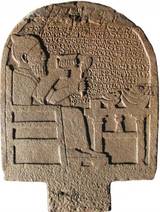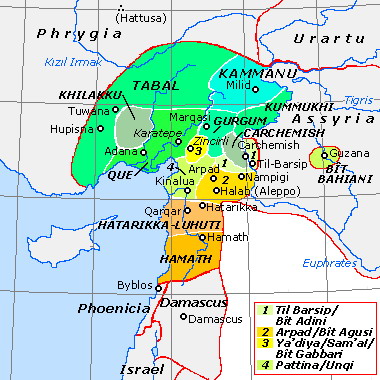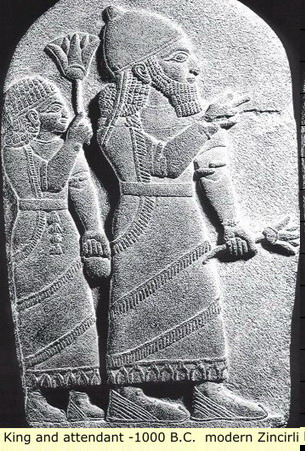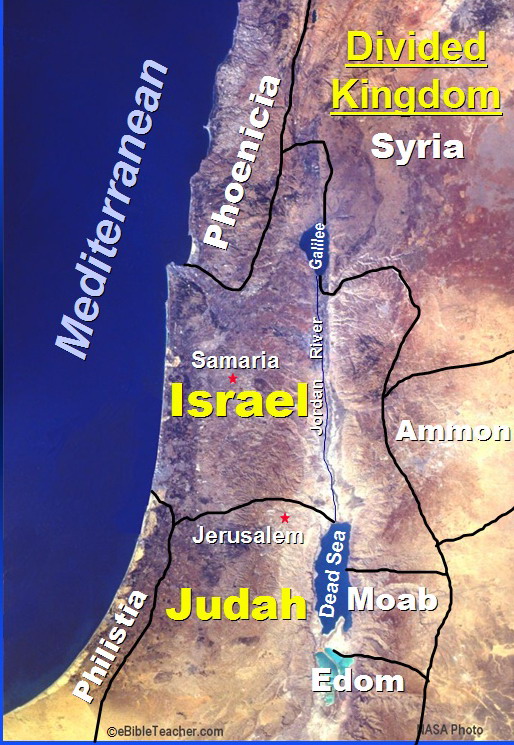Chapter Fourteen.
2-Kings. Chapter 14.
Contents:
King Amaziah of Judah.
Amaziah attacks Edom.
King Amaziah of Judah at War with Joash King of Israel. Joash succeeded by Jeroboam-2. Amaziah followed by Azariah (Uzziah).
SCROLL DOWN\
|
Brit:Am Discussion Group |
Contents by Subject |
Research Revelation Reconciliation Contribute |
|
Site Map Contents in Alphabetical Order |
This Site |
2 Kings 14
King Amaziah of Judah
[2-Kings 14:1] In the second year of Joash the son of Jehoahaz, king of Israel, Amaziah the son of Joash, king of Judah, became king.
Just to keep some kind of perspective: The Kings of Judah and Israel as spoken of so far.
In Israel there reigned: Jeroboam-1, Nadav, Baasha, Elah, Omri, Ahab, Ahaziah, Joram, Jehu, Jehoahaz, Joash, Jeroboam-2.
In Judah the Kings were: Rehoboam, Avia, Asa, Jehoshaphat, Jehoram (Joram), Ahaziah, Athaliah, Jehoash (Joash), Amaziah, Uzziah (Azariah).
Amaziah became King over Judah when Joash reigned over Israel.
[2-Kings 14:2] He was twenty-five years old when he became king, and he reigned twenty-nine years in Jerusalem. His mother's name was Jehoaddan of Jerusalem.
Daat Mikra suggests that the name of his mother is mentioned since she played an important role in the Kingdom.
[2-Kings 14:3] And he did what was right in the sight of the LORD, yet not like his father David; he did everything as his father Joash had done.
We shall see that in fact (as Daat Mikra notes) there were two periods in his life.
a. The Righteous Stage up unto his war against Edom.
b. Idolatry and Disaster after the Edom episode.
[2-Kings 14:4] However the high places were not taken away, and the people still sacrificed and burned incense on the high places.
[2-Kings 14:5] Now it happened, as soon as the kingdom was established in his hand, that he executed his servants who had murdered his father the king.
[2-Kings 14:6] But the children of the murderers he did not execute, according to what is written in the Book of the Law of Moses, in which the LORD commanded, saying, 'Fathers shall not be put to death for their children, nor shall children be put to death for their fathers; but a person shall be put to death for his own sin.'
This is from Deuteronomy 24:16.
It is forbidden for the courts to punish the children of offenders for the sins of their parents.
The Almighty however does punish children for their forebears in the same way as HE rewards the descendants of the Righteous.
# ...For I, the LORD your God, am a jealous God, visiting the iniquity of the fathers upon the children to the third and fourth generations of those who hate Me, 6 but showing mercy to thousands, to those who love Me and keep My commandments # (Exodus 20:4).
The Sages explained that the children of the wicked are punished when they go in the same path as their parents and grandparents. Otherwise, if they are good, they may avoid tribulation.
[2-Kings 14:6] He killed ten thousand Edomites in the Valley of Salt, and took Sela by war, and called its name Joktheel to this day.
The Edomites had rebelled against Judah in the time of Joram (son of Jehoshaphat) the father of his grandfather.
# Sela # This name in Hebrew means "Rock". Nowadays the site is named "Petra" which also means rock.
cf. Josephus (Antiquities 9 ch. 9):
s1....After this he chose him an army out of the tribe of Judah and Benjamin, of such as were in the flower of their age, and about twenty years old; and when he had collected about three hundred thousand of them together, he set captains of hundreds over them. He also sent to the king of Israel, and hired a hundred thousand of his soldiers for a hundred talents of silver, for he had resolved to make an expedition against the nations of the Amalekites, and Edomites, and Gebalites: but as he was preparing for his expedition, and ready to go out to the war, a prophet gave him counsel to dismiss the army of the Israelites, because they were bad men, and because God foretold that he should be beaten, if he made use of them as auxiliaries; but that he should overcome his enemies, though he had but a few soldiers, when it so pleased God. And when the king grudged at his having already paid the hire of the Israelites, the prophet exhorted him to do what God would have him, because he should thereby obtain much wealth from God. So he dismissed them, and said that he still freely gave them their pay, and went himself with his own army, and made war with the nations before mentioned; and when he had beaten them in battle, he slew of them ten thousand, and took as many prisoners alive, whom he brought to the great rock which is in Arabia, and threw them down from it headlong. He also brought away a great deal of prey and vast riches from those nations. But while Amaziah was engaged in this expedition, those Israelites whom he had hired, and then dismissed, were very uneasy at it, and taking their dismission for an affront, (as supposing that this would not have been done to them but out of contempt,) they fell upon his kingdom, and proceeded to spoil the country as far as Beth-horon, and took much cattle, and slew three thousand men.
s2. Now upon the victory which Amaziah had gotten, and the great acts he had done, he was puffed up, and began to overlook God, who had given him the victory, and proceeded to worship the gods he had brought out of the country of the Amalekites. So a prophet came to him, and said, that he wondered how he could esteem these to be gods, who had been of no advantage to their own people who paid them honors, nor had delivered them from his hands, but had overlooked the destruction of many of them, and had suffered themselves to be carried captive, for that they had been carried to Jerusalem in the same manner as any one might have taken some of the enemy alive, and led them thither. This reproof provoked the king to anger, and he commanded the prophet to hold his peace, and threatened to punish him if he meddled with his conduct. So he replied, that he should indeed hold his peace; but foretold withal, that God would not overlook his attempts for innovation....
[2-Kings 14:8] Then Amaziah sent messengers to Jehoash the son of Jehoahaz, the son of Jehu, king of Israel, saying, 'Come, let us face one another in battle.'
Jehoash is called Joash in 2-King 13:12ff and 2 Chronicles 25:17ff. The two names are interchangeable.
# messengers # in Hebrew "Malacim" which is the same word used for angels. An angel is a messenger of the Almighty. Angels exist.
[2-Kings 14:9] And Jehoash king of Israel sent to Amaziah king of Judah, saying, 'The thistle that was in Lebanon sent to the cedar that was in Lebanon, saying, 'Give your daughter to my son as wife'; and a wild beast that was in Lebanon passed by and trampled the thistle.
[2-Kings 14:10] You have indeed defeated Edom, and your heart has lifted you up. Glory in that, and stay at home; for why should you meddle with trouble so that you fall, 'you and Judah with you''
[2-Kings 14:11] But Amaziah would not heed. Therefore Jehoash king of Israel went out; so he and Amaziah king of Judah faced one another at Beth Shemesh, which belongs to Judah.
Let us compare the parallel passage in the Book of Chronicles:
2-Chronicles 25:
5 Moreover Amaziah gathered Judah together and set over them captains of thousands and captains of hundreds, according to their fathers' houses, throughout all Judah and Benjamin; and he numbered them from twenty years old and above, and found them to be three hundred thousand choice men, able to go to war, who could handle spear and shield. 6 He also hired one hundred thousand mighty men of valor from Israel for one hundred talents of silver. 7 But a man of God came to him, saying, 'O king, do not let the army of Israel go with you, for the LORD is not with Israel' not with any of the children of Ephraim. 8 But if you go, be gone! Be strong in battle! Even so, God shall make you fall before the enemy; for God has power to help and to overthrow.'
9 Then Amaziah said to the man of God, 'But what shall we do about the hundred talents which I have given to the troops of Israel''
And the man of God answered, 'The LORD is able to give you much more than this.' 10 So Amaziah discharged the troops that had come to him from Ephraim, to go back home. Therefore their anger was greatly aroused against Judah, and they returned home in great anger.
11 Then Amaziah strengthened himself, and leading his people, he went to the Valley of Salt and killed ten thousand of the people of Seir. 12 Also the children of Judah took captive ten thousand alive, brought them to the top of the rock, and cast them down from the top of the rock, so that they all were dashed in pieces.
13 But as for the soldiers of the army which Amaziah had discharged, so that they would not go with him to battle, they raided the cities of Judah from Samaria to Beth Horon, killed three thousand in them, and took much spoil.
14 Now it was so, after Amaziah came from the slaughter of the Edomites, that he brought the gods of the people of Seir, set them up to be his gods, and bowed down before them and burned incense to them. 15 Therefore the anger of the LORD was aroused against Amaziah, and He sent him a prophet who said to him, 'Why have you sought the gods of the people, which could not rescue their own people from your hand''
16 So it was, as he talked with him, that the king said to him, 'Have we made you the king's counselor' Cease! Why should you be killed?'
Then the prophet ceased, and said, 'I know that God has determined to destroy you, because you have done this and have not heeded my advice.'
17 Now Amaziah king of Judah asked advice and sent to Joash the son of Jehoahaz, the son of Jehu, king of Israel, saying, 'Come, let us face one another in battle.'
Amaziah of Judah fought against Joash King of Israel and was defeated.
Amaziah had first fought against Edom and conquered it.
His treatment of Edom has aroused questions as to whether or not this was in accordance with the Law.
cf. Deuteronomy 2:
4 And command the people, saying, 'You are about to pass through the territory of your brethren, the descendants of Esau, who live in Seir; and they will be afraid of you. Therefore watch yourselves carefully. 5 Do not meddle with them, for I will not give you any of their land, no, not so much as one footstep, because I have given Mount Seir to Esau as a possession.
Josephus (Ant. 9.9.1) above tells us that the Edomites he warred against included "Amalekites, and Edomites, and Gebalites".
The Edomites had other nations and elite warrior clans further to the north.
After defeating Edom, Amaziah began to worship the Edomite idols which he had captured. In principle he should have destroyed all representations of such deities. As punishment he was induced by his own counsel to wage war with the northern Kingdom of Israel (against the will of that Kingdom) and suffer a disastrous defeat. The ostensible reason for the war was probably the ravaging of Judah by the disgruntled Ephraimite mercenaries (who had been peremptorily dismissed) and their slaughter of three thousand men.
Amaziah was probably justified in going to war with Ephraim on this matter but because he had sinned it was occasion of his punishment.
His subject also suffered over this and it may be that they had induced their monarch to act as he did, so they too were culpable.
The Book of Kings continues:
[2-Kings 14:12] And Judah was defeated by Israel, and every man fled to his tent.
[2-Kings 14:13] Then Jehoash king of Israel captured Amaziah king of Judah, the son of Jehoash, the son of Ahaziah, at Beth Shemesh; and he went to Jerusalem, and broke down the wall of Jerusalem from the Gate of Ephraim to the Corner Gate' four hundred cubits.
The gate of Ephraim is considered to have been somewhere near the present Gate of Schechem (Nablus Gate) and may be identical with the Gate of Benjamin mentioned by Jeremiah (20:2).
[2-Kings 14:14] And he took all the gold and silver, all the articles that were found in the house of the LORD and in the treasuries of the king's house, and hostages, and returned to Samaria.
This was not the only time that the forces of Ephraim raided the Temple and took away appliances etc. Did they keep any of it?
Did perchance they take some of it with them into Exile?
[2-Kings 14:15] Now the rest of the acts of Jehoash which he did'his might, and how he fought with Amaziah king of Judah, are they not written in the book of the chronicles of the kings of Israel?
[2-Kings 14:16] So Jehoash rested with his fathers, and was buried in Samaria with the kings of Israel. Then Jeroboam his son reigned in his place.
[2-Kings 14:17] Amaziah the son of Joash, king of Judah, lived fifteen years after the death of Jehoash the son of Jehoahaz, king of Israel.
[2-Kings 14:18] Now the rest of the acts of Amaziah, are they not written in the book of the chronicles of the kings of Judah'
[2-Kings 14:19] And they formed a conspiracy against him in Jerusalem, and he fled to Lachish; but they sent after him to Lachish and killed him there.
[2-Kings 14:20] Then they brought him on horses, and he was buried at Jerusalem with his fathers in the City of David.
Azariah King of Judah.
[2-Kings 14:21] And all the people of Judah took Azariah, who was sixteen years old, and made him king instead of his father Amaziah.
Azariah is called Uzziah in 2-Chronicles 26:1ff, Isaiah 6:1, and elsewhere
[2-Kings 14:22] He built Elath and restored it to Judah, after the king rested with his fathers.
Formerly Elath had been in the hands of Edom. Amaziah had liberated it so now Azariah established a settlement there.
The Jeroboam-2 Empire
[2-King 14:23] In the fifteenth year of Amaziah the son of Joash, king of Judah, Jeroboam the son of Joash, king of Israel, became king in Samaria, and reigned forty-one years.
[2-King 14:24] And he did evil in the sight of the LORD; he did not depart from all the sins of Jeroboam the son of Nebat, who had made Israel sin.
[2-King 14:25] He restored the territory of Israel from the entrance of Hamath to the Sea of the Arabah, according to the word of the LORD God of Israel, which He had spoken through His servant Jonah the son of Amittai, the prophet who was from Gath Hepher.
We have here a mention of Jonah the Prophet.
See the







